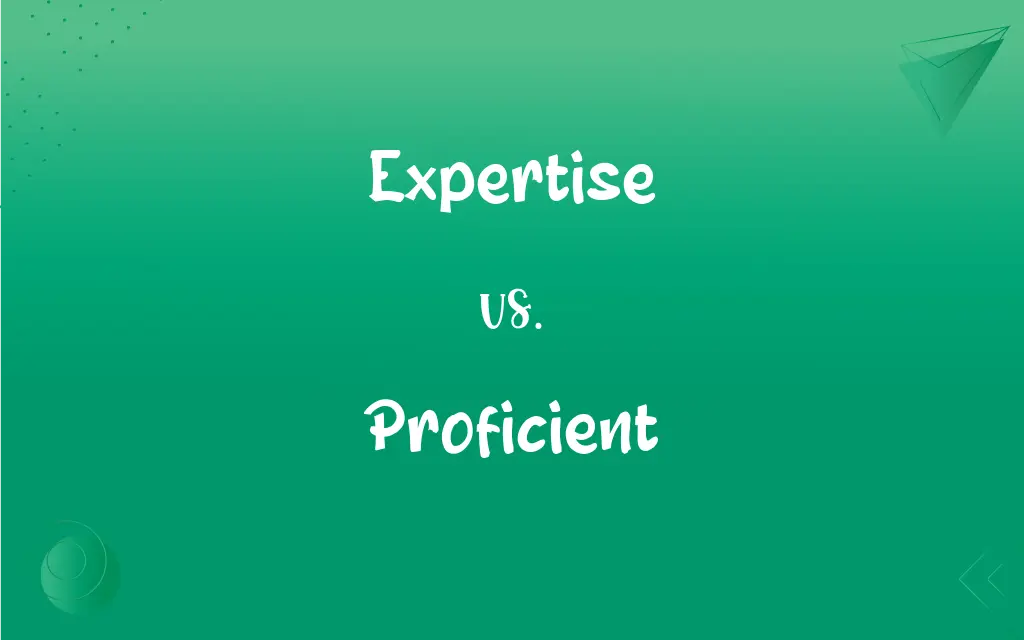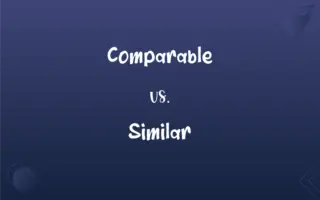Expertise vs. Proficient: What's the Difference?
Edited by Aimie Carlson || By Harlon Moss || Updated on November 6, 2023
Expertise is deep knowledge or skill in a particular field, while being proficient means having a good level of skill or competence in something.

Key Differences
Expertise is a comprehensive understanding of a particular area of study or professional practice. It implies a high level of knowledge or skill that is usually gained through extensive experience and education. An individual with expertise is often seen as an authority or specialist in their field, capable of tackling complex problems with a high degree of competence.
Proficiency, on the other hand, refers to a good level of skill or competence that is sufficient for the demands of a task. A proficient individual can perform tasks effectively and efficiently, but their skill level does not necessarily indicate the depth of understanding or experience that characterizes expertise.
Expertise is often recognized through credentials, advanced degrees, or a substantial portfolio of work. It suggests that a person has dedicated a significant amount of time to mastering a discipline, often focusing on a narrow aspect to gain a sophisticated understanding. People turn to experts when in need of insight on specific, complex subjects.
Being proficient does not always require formal recognition or credentials. Proficiency can be self-assessed or recognized by peers and is often developed through practical experience. While experts are expected to provide solutions to intricate problems, those who are proficient are relied upon to competently execute tasks or apply their skills reliably.
The journey from proficiency to expertise can be long and demanding. Proficiency is an important milestone on the road to expertise; it is the point where one can confidently apply their skills, whereas expertise is the culmination of continued learning and practice, marked by a deep, nuanced understanding of a subject.
ADVERTISEMENT
Comparison Chart
Level of Skill
Deep, specialized knowledge.
Good, competent level of skill.
Recognition
Often requires formal acknowledgment.
Can be self-assessed or informally recognized.
Scope of Understanding
Broad and deep in a specific field.
Adequate for tasks without deep specialization.
Time and Experience
Usually requires extensive time and practice.
Can be achieved in a moderate timeframe.
Reliance and Expectation
Looked to for authority and complex solutions.
Relied upon for effective task execution.
ADVERTISEMENT
Expertise and Proficient Definitions
Expertise
Specialized knowledge in a specific area.
Her expertise in marine biology was invaluable during the research expedition.
Proficient
Competent or skilled in doing something.
She is proficient in several programming languages.
Expertise
Mastery of a subject or skill.
The chess grandmaster’s expertise was unparalleled.
Proficient
Well advanced in an art, occupation, or branch of knowledge.
The musician was proficient in both jazz and classical guitar.
Expertise
Authority recognized in a particular field.
He was often invited to speak due to his expertise in renewable energy.
Proficient
Adequate or satisfactory in performance.
She is proficient in her duties as a project manager.
Expertise
Comprehensive understanding through study or practice.
Her expertise in Italian literature stemmed from decades of study.
Proficient
Having the skill expected of a professional.
His proficient handling of the negotiation led to a successful deal.
Expertise
High level of skill or proficiency.
The surgeon's expertise was evident in the precision of the procedure.
Proficient
Displaying competence or ability in a task.
He was proficient at creating detailed financial reports.
Expertise
Skill or knowledge in a particular area.
Proficient
Having or marked by an advanced degree of competence, as in an art, vocation, profession, or branch of learning.
Expertise
Great skill or knowledge in a particular field or hobby.
The scientist has expertise in the field of nuclear fusion.
Proficient
A person who exhibits such competence; an expert.
Expertise
Advice, or opinion, of an expert.
Proficient
Good at something; skilled; fluent; practiced, especially in relation to a task or skill.
He was a proficient writer with an interest in human nature.
Expertise
To supply with expert knowledge or advice.
Expertise
Skillfulness by virtue of possessing special knowledge
FAQs
Can you be proficient without being an expert?
Yes, proficiency indicates competence, not necessarily the depth of expertise.
Is expertise subjective?
It's often recognized by objective measures such as credentials or peer recognition.
What is expertise?
Deep knowledge or skill in a particular area.
Can proficiency lead to expertise?
With continued learning and practice, it can.
Is expertise in one area transferable to another?
Not directly, but learning skills can be beneficial across fields.
Is expertise recognized globally?
Expertise is generally recognized across borders, especially in standardized fields.
What's an example of being proficient?
Being able to converse in a foreign language fluently.
How can one demonstrate expertise?
Through publications, teaching, or a portfolio of work.
What does proficient mean?
Competent or skilled in performing a task.
How is expertise acquired?
Through extensive education, experience, and practice.
Are all experts also proficient?
Yes, proficiency is typically a prerequisite for expertise.
Does expertise guarantee success in a field?
Not guaranteed, but it significantly increases the likelihood.
Is there a proficiency test for expertise?
Tests can measure proficiency; expertise is often gauged through peer review.
Can you self-assess proficiency?
Self-assessment is common for proficiency but less so for expertise.
What's more valuable, proficiency or expertise?
Depends on the context; both have their place.
Can proficiency be lost over time?
Without practice, proficiency can diminish.
Can proficiency be innate?
Some level of natural aptitude can lead to proficiency, but practice is also necessary.
What is a proficient level?
It is a level of ability where one can perform tasks well and reliably.
Do experts need to revalidate their expertise?
Continuous learning is important to maintain expertise.
Do job postings require proficiency or expertise?
Depends on the position; some require one, both, or a combination.
About Author
Written by
Harlon MossHarlon is a seasoned quality moderator and accomplished content writer for Difference Wiki. An alumnus of the prestigious University of California, he earned his degree in Computer Science. Leveraging his academic background, Harlon brings a meticulous and informed perspective to his work, ensuring content accuracy and excellence.
Edited by
Aimie CarlsonAimie Carlson, holding a master's degree in English literature, is a fervent English language enthusiast. She lends her writing talents to Difference Wiki, a prominent website that specializes in comparisons, offering readers insightful analyses that both captivate and inform.































































